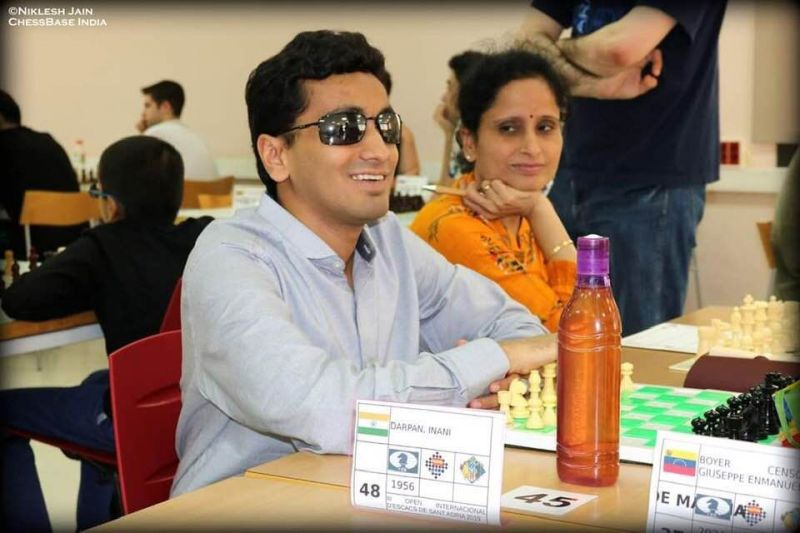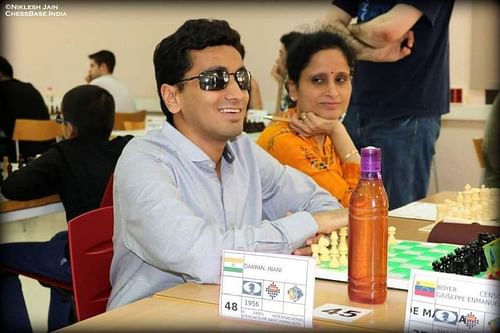
An exclusive interview with blind Indian Chess player Darpan Inani

Darpan Inani is India's highest-rated blind chess player. He is 100% visually challenged. Accompanied by his mother almost always during tournaments, Inani doesn't leave any stone unturned in his quest to excel. Last year, we had reported on him becoming the first Indian blind player to win in an international open tournament.
Now, he has improved his record to a step further by becoming the first blind Indian in history to cross the 2100 Elo rating and the first currently active visually impaired player in Asia to achieve this feat. In an exclusive interview, Darpan talks about his records, performances, practise routine, and much more. So, without wasting more time, let me move on to the questions and answers with Inani.
1. Congrats on becoming the first Asian Blind chess player to achieve a rating of 2100+ ELO. How does it feel to secure this amazing record?
Thanks Devanshi for your wishes! Let me first clarify that I am not sure whether I am the first-ever Asian blind player to have crossed the 2100 Elo rating, but the one thing that I am certain about is that I am currently the highest-rated active blind player in Asia and no one is above 2100 rating at present in Asia. Moreover, I also need to point out that my rating will be 2117 and it is yet to be published. It will be seen on the 1st of October as FIDE releases its October rating list. It feels amazing to be the highest rated Blind player and also the only player above 2100 elo in Asia currently. The fact that I have achieved this rating by playing only in sighted tournaments makes it a bit more special.
2. You are also a Chartered Accountancy (CA) student along with being a chess player. How do you manage to balance both these priorities?
I am a CA final student, having had already cleared one group of the CA finals with only one other group (4 papers) remaining. Obviously, managing chess and the CA finals is not easy as you already know that a coveted professional course of CA has one of the longest syllabi and is amongst the toughest accounting courses not only in India but in the entire world. However, I had this very crystal clear ambition of balancing chess and academics simultaneously from the beginning when I picked up chess at the age of 13, and, when you have a goal, you somehow achieve it! I have to admit that because of CA, I’ve not been able to compete in more than 4 tournaments yearly on an average in the last 4 years. However, whenever my tests are over, I try to prepare and play in some tournaments within the two months of these exams finishing.
3. Coming back to the record, can you please share your journey in this month and a half chess tour of Europe that you took, participating in a number of events back to back?
In all, I participated in four tournaments that ran from the last week of July to the very beginning in September in Europe, two tournaments in Germany and Spain each. So, I played 33 games in total and increased 161 rating points with a K factor of 20. I had gone to Europe with a rating of 1956 and as aforementioned in my answer to your first question, my rating will be 2117 in October. It was an amazing experience overall. The first tournament was the Kiel Open in Germany where I decreased 9 points, the second was the Lueneburg Open again in Germany where I increased 65 points, the penultimate was the Sant Adria in Spain where I increased 40 points, and the finale was the Barcelona Sans Open where I increased 65 points. It was an enriching experience to play in these tournaments and face opponents from different countries of the world.
4. Being a 100% visually challenged player, it must have taken a lot of courage to play in an open tournament. Looking at your track record, you have largely played in open tournaments only. How do you manage in such events? What benefits do the tournaments abroad present you?
Despite being 100% visually impaired, my entire academic career has been with the mainstream. I never learnt Braille in my life. Absolute integration with the mainstream had been my parents' and my goal right from the very beginning. So, obviously, that permeated into whatever I did, even chess. I’ve played 90% of my tournaments amongst the sighted field only. In such tournaments with the sighted, the competition is high and one gets to rub one's shoulders with the players who are highly updated with the latest knowledge in the field because everything is accessible to them. So, that’s a challenge and overcoming odds is something that gives me a sense of joy and satisfaction. Of course, it’s a tough task, but I have wonderful parents and am also blessed to be surrounded by a wonderful set of family, friends, teachers and people in general who have ever known me or come to know of me. These are a constant source of encouragement and keep me going.
5. Can you talk about how you prepared for the tournaments in Europe? There are quite a few accessibility issues when it comes to reading and analysing chess books. How do you manage to train in such circumstances?
Yeah, there are accessibility issues, and, especially when you are 100% blind it’s difficult to access all the chess material that a sighted person can use without any bit of effort. Nevertheless, I’ve worked around and figured out ways in chess software for myself to access almost 80% of the material in soft copy. And we know the 80/20 principle (the Pareto analysis, the idea that by doing 20% of the work you can generate 80% of the benefit of doing the entire job). So, that serves the purpose in most cases. Now, coming specifically to the preparations I made before this Europe trip, it was the self-study of the opening repertoires, middle-game problem solving, and my parents helped me with the chess videos that dealt with the areas I wanted to improve in. Also, I had in total of 14 hours of online sessions on Skype with my coach and a great friend Narayanan Srinath as he was in Europe at that time. I had also worked for four days in person with Hemal Thanki who is based out of Gujarat itself. So, these were the only preparations that I had managed to do in the one month's time that I received between my exams and this chess trip.
6. You’re also a motivational speaker and have spoken on various platforms including the TEDx. Can you tell us about these events and how does it impact your career?
Since 2017, I’ve been invited on various platforms to deliver talks and motivational lectures. These include TEDx talks of various universities and colleges, as panellists in social conclaves, and as a speaker in a few corporate events and annual functions of non-profit organisations. I am glad that people find me and my life journey inspiring, and I feel a sense of accomplishment when they tell me that I’ve made a positive impact in their lives and that they have obtained a new dimension after hearing about me and my challenges. This not only helps me to satisfy my need of self-actualization as per the Maslow’s hierarchy but, in turn, enables me to learn new things and experiences of different people who have their own unique life journeys and accompanying set of challenges. It also expands my network with a multitude of people from different fields and walks of life.
7. Now that you have returned from this tour what does your schedule look like for the coming months and perhaps the next two years?
I have some exams in the month of November. So, I look forward to playing in open tournaments in Europe in January 2020 and reach 2200 Elo post the exams. The long term goal is to become an international master (IM) 2 to 3 years down the line. Let’s see how it goes!
8. The things that you do- chess, accountancy, and public speaking- requires a rigorous amount of energy, strength, and coordination. Do you have any hobbies that keep you motivated to do these things well?
Preparing for my CA finals, playing in international level sighted chess tournaments, and motivational speaking requires rigorous coordination, a lot of mental energy, and some physical exertion as well. My main hobby is reading a lot of self-help and psychology books or at least skimming through them. So, this helps with mental energy. Moreover, the challenges that I have had to encounter or may have to face somehow helps to keep the mental energy intact! (challenges don’t allow the mental energy to deteriorate or even to stay stagnant, hahaha!) Also as mentioned previously in one of my answers, the wonderful set of people that I've met along my journey makes it worth it!
9. Finally, would you please like to share any concluding thoughts and give us some motivational tips?
Obstacles don't have to stop you. If you run into a wall, don't turn around and give up. Figure out how to climb it, go through it, or work around it. People should not confuse disability with inability. You are the product of your decisions and not that of your circumstances. The winds and the waves are always on the side of the ablest navigators!
Rapid Fire - (Answer in 1-2 words)
1. Favourite destination - Switzerland
2. Favourite chess tournament - I assume that you are asking the favourite tournament I’ve played in, it is the Lueneberg Open, Germany.
3. Classical/Rapid/Blitz Chess - Classical
4. Favourite book - The Success Principles by Jack Canfield
5. Role Model - Aamir Khan. In chess, Vishwanathan Anand.
6. Top Chess Player Currently for You - For me, it’s always Vishwanathan Anand.
7. Playing or Studying Chess - Playing chess
8. Favourite film - 3 idiots
9. Favourite food - All fast food, especially Pav Bhaji.
10. Next World Champion According to You - Magnus Carlsen